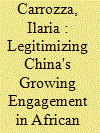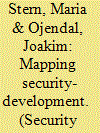| Srl | Item |
| 1 |
ID:
183241


|
|
|
|
|
| Summary/Abstract |
Peace and security were once marginal in Sino-African relations. Recently, however, reflecting China's more proactive role as a global security actor, they have become central. Yet while China's actions mirror this shift, the official China–Africa discourse has not changed. This article, based on fieldwork interviews and discourse analysis of official Forum on China–Africa Cooperation (FOCAC) documents, proposes a theoretically grounded study of China's Africa discourse to account for the role it plays in maintaining continuity through time. It makes a threefold claim. First, while the China–Africa discourse has not been given much attention in the literature, it is crucial to explaining the overall success of China's engagement in the continent. Second, the shift in China's policies towards greater participation in peace and security is not mirrored by changes in the official discourse. Third, and related, this is owing mostly to the successful articulation of the link between the promotion of economic growth and the achievement of stability – the security–development nexus – and to the generally positive reception the discourse has found among African leaders.
|
|
|
|
|
|
|
|
|
|
|
|
|
|
|
|
| 2 |
ID:
104028


|
|
|
|
|
| Publication |
2011.
|
| Summary/Abstract |
The critical and considered response by Simon Reid-Henry (2011) reinforces our sense that the widespread attention being given to the 'security-development nexus' in the realm of policy warrants careful and critical scrutiny. Perhaps most significantly, Reid-Henry's review article draws attention to the need to engage in the difficult - and often overlooked - questions of methodology: how can we creatively study the different ways in which the 'nexus' is being practised, negotiated and resisted in distinct sites - and to what effect? His comments therefore add much to our collective (yet necessarily disparate) efforts to develop an array of creative methodologies for the study of the 'nexus'. Continuing the spirit of constructive critique, we engage with some of his main lines of argument. It is vital, we believe, to remember that there are many ways of exploring the politics of security-development, each requiring different road maps. Furthermore, as Véronique Pin-Fat reminds us, even the astute and committed pursuance of any given map may blind us to 'finding' what we are looking for.
|
|
|
|
|
|
|
|
|
|
|
|
|
|
|
|